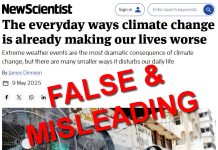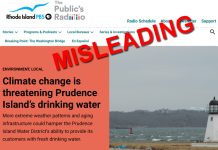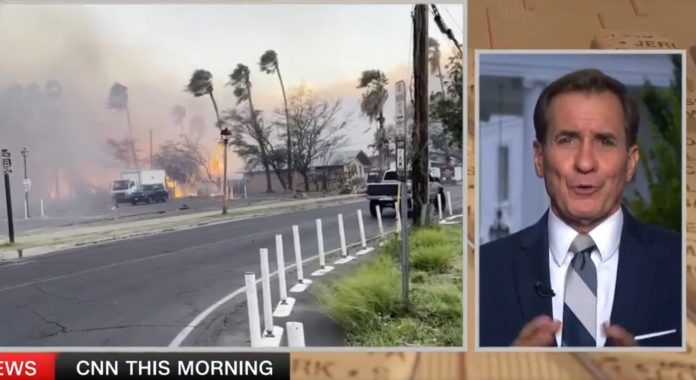John Kirby, White House National Security Council Coordinator for Strategic Communications, told the audience at “CNN This Morning” that President Joe Biden is still considering declaring a climate emergency, and that “all” severe weather we have seen lately are “definitely” because of climate change. This is false. There is no way to link any individual storm to long term climate change, and severe weather events, contrary to mainstream media portrayals, have not become more numerous or severe.
Kirby told CNN This Morning anchor Poppy Harlow that the Biden administration is laser-focused on climate change. He also claimed that extreme weather like storms, as well as natural disasters like the ongoing deadly wildfires in Hawaii, are due to climate change.
Kirby said:
“All I can tell you is that, as an administration, we’re going to stay focused on the climate crisis. It is front and center. It is right in front of us. And these wildfires and all the severe storms that we’re — that we continue to see are definitely caused as a result of what’s going on in the rising temperature across the globe. And so, we’ve got to treat this seriously.”
This is exactly the kind of false narrative that “attribution scientists” have been cultivating for years, which Climate Realism refutes after nearly every major weather event.
First, climate scientists understand that weather is not climate. Climate is measured over thirty year periods of time, whereas weather occurs over the course of hours to days. If there were long term measured trends that showed increasing severity of weather events, Kirby and the Biden administration would at least have some evidence to hang their claims on, but real-world data show no such trends.
The data on wildfires, for example, show a declining trend. You read that right, wildfires aren’t getting worse. In the Climate Realism post “Right, Wall Street Journal, Wildfires Are Declining as Climate Changes,” H. Sterling Burnett points out that satellite data show a 25 percent decrease in acreage lost to fires since 2003.
For the recent fires that tragically claimed dozens of lives and destroyed much of Maui’s town of Lahaina, again there is no evidence that a modest warming of the global average surface temperature was the cause. Instead, as detailed here by atmospheric scientist Cliff Mass, a combination of invasive dry grasses, poor land management, drought, strong winds, and the natural topological features of the Hawaiian islands, converged into a tinderbox scenario.
The trade winds that developed the day leading up to the fires were caused by an unlucky combination of low pressure from hurricane Dora to the south of the islands, and high pressure to the north.
Mass explains that conditions earlier this year likely led to more burnable grass that was dried out later, “[t]he situation this year on Maui was made even more dangerous on Hawaii because the past half-year was WETTER and COOLER than normal, which enhanced grass growth.”
Extreme weather events not related to wildfires have likewise seen no “enhancement” from climate change.
Other recent weather events that the mainstream media blamed on climate change this year, claims dutifully refuted at Climate Realism, include, for example; heatwaves in the American southwest, a hot water temperature reading in Florida, flooding in Vermont, and “weather whiplash” in India. Long term data do not support the claim that any of these weather events are occurring more frequently or becoming more severe when they occur.
The claim that various storms and heat waves can be attributed to climate change comes from various groups that practice “climate attribution,” which as Climate Realism has discussed in the past, here, here, and here, for instance, are not scientifically rigorous or honest.
Attribution groups compare real world data –sometimes while the weather event is barely even over yet—to computer simulations that try to estimate what the climate conditions would be like had humans never started burning fossil fuels. They start out by assuming that climate change played a role in enhancing the severity of the weather event — never the other way around—and then attempt to model it and assign a percentage “likelihood” for the event occurring. This is not science, but rather trying to shoehorn data to fit preconceptions about the consequences of climate change. Alarmists in the mainstream media never report on these attribution studies as though there is any uncertainty involved, despite them being more akin to sideshow crystal ball gazing than rigorously tested scientific claims.
As shown in Climate at a Glance, historical data is available for the range of weather events making headlines in recent years, and more often than not, there is no worsening trend. The Biden administration would more effectively help communities and people harmed by severe weather events, if they focused, not on climate change, but on the real causes of natural disasters and how to anticipate and mitigate them. Such efforts would help communities harden infrastructure, improve warning systems, and speed response and recovery, so when extreme weather events occur, they destroy fewer lives and properties, and so that disruptions from such events are less severe and long-lasting, regardless of climate change or fossil fuel use.




















